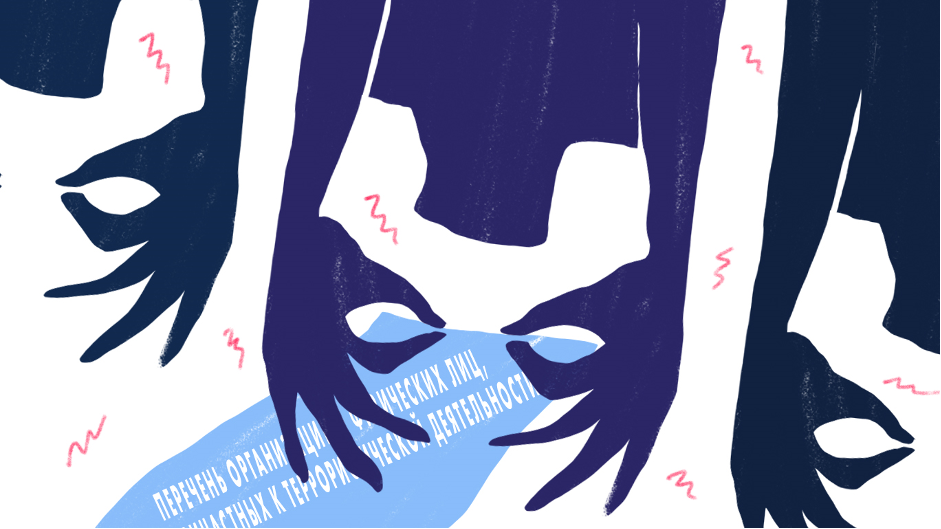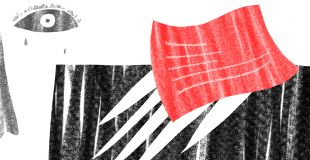
Human Constanta collects information and analyzes tendencies related to the topic of “extremism” in Belarus from the point of view of international human rights standards. The present issue covers the three months of 2021. We collect and analyze relevant publicly available information , consider individual cases, and attend court sessions on the topic.
The peculiarity of this period was that the word “extremism” was found in the news reports of the Ministry of Internal Affairs almost every day. During the study, we learned about 18 new criminal cases under Article 130 of the Criminal Code (“incitement of racial, national, religious or other social hostility or discord, rehabilitation of Nazism”). We analyzed the politicization of Article 289 of the Criminal Code (“act of terrorism”), as well as proposals to amend the Law “On Countering Extremism”. We followed new cases of administrative offenses, found local and large opposition Telegram chats in the updated list of “extremist materials”, and women’s names in the list of “terrorists”. We have seen pictures, books, and videos recognized as “extremist”. For more information, see the review.
Содержание
The official statistics for 2020
According to official information from the Ministry of Internal Affairs (hereinafter – the Ministry of Internal Affairs) and the Supreme Court on ” extremist ” articles for 2020, the following criminal cases were opened under the Criminal Code (hereinafter-the Criminal Code):
- Article 293 of the Criminal Code (“mass riots”) – 15 cases;
- Article 289 of the Criminal Code (“act of terrorism”) – 10 cases;
- Article 290-1 of the Criminal Code (“financing terrorist activities”) – 2 cases;
- Article 290-2 of the Criminal Code (“promotion of terrorist activities”) – 1 case;
- Article 290-4 of the Criminal Code (“creation of an organization for carrying out terrorist activities or participation in it”) – 1 case;
- Article 357 of the C riminal C ode (“conspiracy or other actions taken with the goal of seizing state power”) – 1 case;
- Article 361 of the C riminal C ode (“incitement to action to harm the national security of the Republic of Belarus”) – 1 case;
- Article 130 of the C riminal C ode (“incitement of racial, national, religious or other social strife, the rehabilitation of Nazism”) – 22 cases opened, with 5 people comvicted, including one minor.
As in 2019, in 2020, about 200 protocols on administrative offenses under “extremist” articles were drawn up in accordance with the Code of Administrative Offenses (hereinafter referred to as the Administrative Code).):
- Article 17.10. of the Administrative Code (“propaganda or public display, production, distribution of Nazi symbols or paraphernalia”) – 88 cases;
- Article 17.11. of the Administrative Code (“distribution, production, storage, transportation of information products containing calls for extremist activities or promoting such activities”) – 101 cases;
- Article 17.14. of the Administrative Code (“illegal production and (or) distribution of techniques or other materials on the methods of manufacturing explosive devices and explosives”) – 1 case.
At the same time, on March 4, 2021, the former head of the Investigative Committee publicly stated that “since the post-electoral events of 2020, 2,407 criminal cases on “extremism” have been opened in Belarus. It includes everything from putting offensive graffiti on the walls to using violence against law enforcement officers.”
This interpretation contradicts the text of the Law ” On Countering Extremism ” (hereinafter – the Law), according to which the application of producing inscriptions on walls and violence against law enforcement officers is not included in the list of extremist actions, except in cases where such actions are regarded as a violation of paragraph 11, part 1, Article 1 of the Law as ” obstruction of the legitimate activities of state bodies”. At the same time, the Belarusian authorities intend to expand the list of “extremist actions” by introducing amendments to the Law. The analysis of the proposed amendments was carried out in a separate analytical review of Human Constanta. Based on the rhetoric of public figures, any manifestation of dissent in relation to state policy can be qualified as “extremism”.
The criminal cases for “extremism” – key narrative in the police reports

During the three months analyzed, the reports of the press service of the Ministry of Internal Affairs often spoke about ” cases of extremism”. At the same time, the definition of extremism often included actions that were not mentioned in the current version of the Law. Most often, the press service of the Ministry of Internal Affairs presented the news as facts, suggesting the guilt of the accused and violating the presumption of innocence, and accompanied them with video footage showing “remorse of people” suspected of extremist activities. For the first time, criminal cases were opened on the “rehabilitation of Nazism”. As part of one of these cases, a famous artist was taken into custody for a painting. In total, we are aware of 18 new cases under the article on “incitement of enmity or discord, rehabilitation of Nazism” (Article 130 of the Criminal Code). When dealing with cases of extremism, Belarusian courts considered police officers as a “different social group” against which “enmity was incited”, although international standards prescribe that civil servants cannot be a social group that requires additional protection. There were new charges and first sentences were imposed for “terrorist acts”. Local citizens’ chats on social media began to be recognized as “extremist groups” even before the amendments to the Law came into force.
On the 5th of February 2021, the Minsk City Court announced the verdict under Article 130 of the Criminal Code (“incitement of racial, national, religious or other social enmity or discord, rehabilitation of Nazism”) against blogger Pavel Spirin. He received 4.5 years of imprisonment in a medium security prison (the maximum term of imprisonment under this article is 5 years) for distributing two videos on socially sensitive topics. The affected social group, according to the prosecution, was a “different” group of persons united on the basis of their professional affiliation: employees of the prosecutor’s office, judges, deputies, senior officials of the Republic of Belarus, police officers, members of special purpose police units (hereinafter referred to as OMON), and even the Minister of Internal Affairs of the Republic of Belarus. This verdict was based on the conclusions of state experts . At the same time, an independent examination showed that these groups cannot be qualified as “other social” groups within the meaning of the Law, and Pavel’s videos contain only criticism of the above-mentioned groups without signs of inciting hostility. Human Constanta conducted a detailed analysis of this case as part of its court cases monitoring project. Pavel was recognized by human rights organizations as a political prisoner.
The same sentence under Article 130 of the Criminal Code on March 26, 2021 was received by a man in Vitebsk, who posted videos on the social network “TikTok”, related, according to the prosecution, to “the formation of a hostile socio-psychological attitude towards representatives of the police, the command and commanding staff of the army.”
Earlier, we wrote that criminal cases for “inciting enmity or discord” (Article 130 of the Criminal Code) were opened against bloggers Sergei Tikhanovsky (awaiting trial), Roman Protasevich and Stepan Putilo. In the first 3 months of 2021, it became known about the initiation of 18 more cases in various cities for “inciting hostility” (now they began to call calls to violence or insults) or for ” rehabilitating Nazism” :
- On the 20th of January, it became known that a case was initiated under Article 130 of the Criminal Code against a woman who posted several posts on the social network ” with calls for violence against policemen and their families.” The Main Directorate of its own Security (hereinafter – GUSB) The Ministry of Internal Affairs in connection with this case recalled that ” calls for violence against police officers, their relatives and friends are a direct manifestation of extremism” ;
- In January, a resident of Polotsk was detained “for insulting a teacher of the Academy of the Ministry of Internal Affairs and calling for violence against police officers.” The investigators opened criminal cases for insulting a representative of the government and inciting social hostility and discord;
- A resident of Homel was detained for “calling for violence against policemen via Telegram”. A resident of Baranovich was detained on a similar charge – both are charged with Article 130 of the Criminal Code;
- On the 15th of February, the Prosecutor’s Office of the Grodno region sent a criminal case to the court against a resident of Novogrudok, who was charged with inciting social hostility and discord on the basis of social affiliation, as well as insulting the President of the Republic of Belarus. According to the prosecutor’s office, he posted messages in Telegram, in which he called for aggressive actions against employees of the internal affairs bodies;
- On the 26th of February, according to the press service of the I nterior Ministry, “the author calls for violence against police ” who “regularly and methodically described sadistic reprisals against law enforcement officers in Grodno Telegram chat ” was arrested;
- in early spring it became known that under part 3 of article 130 of the C riminal C ode filed cases against members of the initiative BYPOL and former prosecutors Oleg Talercio and investigator Igor Lobanov;
- On the 19th of March, a history teacher from Smorgon, Andrei Petrovsky, who lost his job at a local school after a lesson with eleventh-graders, where one of the students took a video, was visited by security forces. He claimed that the claims of law enforcement officers were related to “inciting social hostility”. Petrovsky was accused of allegedly showing children a video containing footage from the Telegram channel, “which cannot be name ” (meaning the Nexta channel, which is recognized as “extremist”). The teacher claimed that he was just teaching a lesson on t he system of international relations and telling students about the Collective Security Treaty Organization and there was no extremism in his stories;
- On the 19th of March, a resident of Molodechno was detained for “inciting social hostility”. In local chat rooms, he spoke negatively about the police, and the linguistic expert examination conducted by the prosecution showed that his statements contained calls for violence;
- On the 22 of March, it became known that the Investigative Committee is investigating another criminal case on inciting social hostility and hatred against employees of the internal affairs bodies, military personnel and members of their families. The suspect in the case is a 31-year-old man who spoke negatively and allegedly called for violence against the above-mentioned groups of the population;
- On the 23rd of March, the Investigative Committee and the Ministry of Internal Affairs said that they had established the involvement of a 35-year-old telecommunications engineer and a 24-year-old sales specialist of Beltelecom “in aiding and abetting social hatred and discord.” According to operational data, they distributed information about employees of the internal affairs bodies in various Telegram channels not only to deanonymize law enforcement officers, but also to assist ” destructive telegram channels in creating conditions and encouraging the use of violence.”»;
- On the 25th of March, a resident of Novopolotsk was detained for “publicly insulting and inciting social hostility” in various Telegram chats. In addition to Article 130, he is charged with Article 369 of the Criminal Code (“insulting a representative of the authorities” );
- On the 25th of March, the press service of the Ministry of Internal Affairs announced the initiation of a criminal case for “rehabilitation of Nazism” in Homel against a pensioner who ” in 2016 created and until now administered several websites and pages in social networks where he published extremist materials” ;
- Under Article 130 of the Criminal Code, a resident of Mikashevich was also detained – he also wrote various messages in Telegram;
- An additional charge under Article 130 of the Criminal Code was received by human rights activist and political prisoner Maria Rabkova, who has been in custody since September 2020. Previously, she was accused of “financing mass riots” (part 3 of Article 293 of the Criminal Code), and now Article 130 and Part 2 of Article 285 of the Criminal Code (“creation of a criminal organization or participation in it”) were added to the charge – probably in connection with the activities of one of the anarchist groups in Belarus;
- On the 10th of March, it became known about the criminal case against the popular blogger Anton Motolko, who is located outside of Belarus. The Investigative Committee suspects the blogger under five articles of the Criminal Code: Part 3 of Article 130 (“inciting social hostility on the basis of professional affiliation in relation to government officials and law enforcement officers”), Article 293 (“mass riots”), Article 342 (“organizing and preparing actions that grossly violate public order”), Part 3 of Article 361 (“calls for actions aimed at harming the national security of the Republic of Belarus”) and part 1 of Article 361-1 (“creating an extremist formation”).
Starting in the summer of 2019, the Law and the Criminal Code were amended on the prosecution of “rehabilitation of Nazism”. The first cases of this nature took place in March 2021 in Brest and Grodno against several people at once: on March 10, the Brest Prosecutor’s Office opened a criminal case on the fact of glorification of war criminals under Part 3 of Article 130 of the Criminal Code. The reason for the proceedings was an “illegal mass event” that took place on the 28th of February in the premises rented by the Brest Forum of Polish Local Initiatives and the Polish School. The school’s co-founder is being held in a temporary detention facility as a suspect. The headmistress of the school, Anna Panisheva, said that all the events were held for educational purposes, calls the accusations “far-fetched” and believes that their goal is to “eliminate” the Polish school.” Then, on the 25th of March, the apartment of the Grodno journalist and one of the leaders of the Union of Poles of Belarus, which is not recognized by the authorities, Andrzej Poczobut, was searched in Grodno, as well as in the editorial office of the newspaper Głos znad Niemna and the magazine Magazyn Polski, which are published by the organization. With searches came to the representatives of the organization in Volkovysk and Lida. The chairman of the unregistered Union of Poles of Belarus, Anzhelika Boris, was detained and sentenced to 15 days, and the prosecutor’s office opened a criminal case against her and Andrzej Poczobut under the article on inciting racial, national, religious or other social hostility or discord.
Another criminal case for the rehabilitation of Nazism (part 3, Article 130 of the Criminal Code) was initiated by the Prosecutor’s Office of the city of Grodno, this time against the head of the private institution “Center for Urban Life” Pavel Mozheyko and artist Ales Pushkin. On March 19, the exhibition of paintings showed a portrait of the historical figure Yevgeny Zhikhar made by Ales Pushkin with a machine gun on his shoulder, which the investigators considered collaborationist. Pavel Mozheyko was held in a pre-trial detention center for three days and released, and Ales Pushkin was taken into custody on the 30th of March.
Thus, we observe the practice of expanding the application of Article 130 of the Criminal Code, in which police officers were actively recognized as a “different social group”, and also regarded statements critical of the authorities as “ insults ” and “incitement to hostility”. This article was also used against representatives of Polish organizations in Belarus – presumably, as a response to the sanctions of the European Union and a reason for creating a political conflict.
The new trends in the “rehabilitation of Nazism” contradict international standards of the right to freedom of expression, according to which political criticism and analysis of historical topics cannot be grounds for criminal prosecution.
In addition to the prosecution for “inciting enmity or discord”, the practice of prosecution continues under other “extremist” articles: according to the human rights center “Viasna”, it became known that 230 people in Belarus are involved in cases of ” mass riots ” (Article 293 of the Criminal Code).
The use of Article 289 of the Criminal Code (“act of terrorism”) is also expanding – on the 29th of March, the Prosecutor General’s Office opened a criminal case against Sviatlana Tsikhanouskaya and the participants of the BYPOL initiative “for preparing an act of terrorism as part of an organized group”. According to the agency, ” these persons … tried to carry out explosions and arson on the territory of Minsk and other cities. Citizen Maleychuk, who was detained in the act, has already testified about the organizers and participants of the terrorist attack.”
On a similar charge, the first trial has already taken place – on the 15th of March, the Smorgon district court appointed 8 years and 1 month of imprisonment in a high-security prison for a resident of Golshan Ivan Verbitsky on charges of incitement to an act of terrorism (p art 5, Article 16 of the Criminal Code and p art 1, Article 289 of the Criminal Code), as well as theft, destruction, damage or concealment of documents (p art 1, Article 377 of the Criminal Code).
On the 31st of March, it became known that the political prisoner and anarchist Mikalai Dziadok , in addition to Article 342 of the Criminal Code (“organization and preparation of actions that grossly violate public order, or active participation in them”), is accused under two more “extremist” articles : p art 3 of Article 361 of the Criminal Code (“calls for actions aimed at harming the national security of the Republic of Belarus”) and part 1 of Article 295-3 (“illegal actions against objects, the damaging effect of which is based on the use of flammable substances”). Now he faces up to 5 years in prison.
The Main Directorate for Combating Organized Crime and Corruption (hereinafter referred to as GUBOPiK) is actively fighting) The Ministry of Internal Affairs with “yard chats”. The department said that over the past month, employees of the GUBOPiK Ministry of Internal Affairs have established a number of participants and administrators of yard Telegram chats. GUBOPiK promised to give a “legal assessment of the creation or leadership of extremist groups” (Article 361-1 of the Criminal Code) in relation to the actions of the administrators of the most “radical” of the chats.
In total, the division found over a thousand “radical” Telegram channels. O n 11th of March, GUBOPiK employees detained seven active participants of a closed courtyard chat in the Moskovsky district of Minsk. They are being checked for the creation or leadership of extremist groups (Article 361-1 of the Criminal Code).
On the 16th of March, the administrator of the local chat and Telegram channel “Novaya Borovaya 98% ” was detained. According to the Ministry of Internal Affairs, the man was issued an official warning in accordance with the Law. A criminal case has also been opened against him for “creating an extremist group”. According to the same article, there are seven residents of Dzerzhinsk, who are both administrators and regular participants of local Telegram chats. The mass media reported on the detention of participants of chats from Lida, where various criminal cases were opened: from insulting government officials and threats of violence against police officers to bringing the communication routes into disrepair. However, all the defendants were also issued official warnings in accordance with the Law.
“Extremist” administrative offenses

In the first three months of 2021, we became aware of one case for distributing Nazi symbols and five cases for distributing “extremist materials”. The new practice of law enforcement agencies includes both bringing people to administrative responsibility for public activity, and issuing official warnings to them. We have considered the following cases of administrative prosecution:
- On the 13th of February, in Novopolotsk, a woman was brought to administrative responsibility under Article 17.10 of the Administrative Code (“propaganda and (or) public display, production and (or) distribution of Nazi symbols or paraphernalia”) for “attracting customers” to her private bathhouse with Nazi symbols. In one of the advertising accounts, the police found photos of visitors with Nazi paraphernalia, which caused a search in the institution, during which clothing imitating the uniforms of the German troops, a helmet and dishes with the image of Nazi symbols were seized. The court fined the woman 5 basic units (145 rubles), and also confiscated all the mentioned things;
- On the 29th of January in the editorial office of Hrodna. life, as well as in the house of the editor-in-chief Newgrodno.by searches were conducted (which, according to Belarusian legislation, can only be carried out in criminal cases). According to the police, during the monitoring of the Internet, the facts of storage of products recognized as extremist by these resources were revealed. The products in question were the materials of the Telegram channel Nexta, which has already been recognized as extremist three times. On March 19, in the Leninsky district court of Hrodna, the editor-in-chief of Hrodna.life, Alexey Shota, was fined 400 basic units (11,600 rubles) – as a representative of the organization – and 25 basic units (725 rubles) – as an individual – under Article 17.11 of the Administrative Code (“distribution, production, storage, transportation of information products containing calls for extremist activities or promoting such activities”), and his laptop was confiscated;
- Employees of the Minsk Department of Internal Affairs on Air Transport drew up a protocol under part 1 of Article 17.11 of the Administrative Code against the journalist Roman Vasyukovich. In December last year, a laptop and two copies of the book “Belarusian Donbass” were seized from the journalist at the airport, in which the Minsk Regional Expert Commission for the Evaluation of information Products for the presence (absence) of signs of extremism found “manifestations of extremism”. On March 26, the court of the Oktyabrsky district of Minsk recognized the book as “extremist material”. The final court hearing on this administrative offense case is scheduled for 7th of April;
- According to the official information of BELTA, on February 9, five administrators of the Telegram chat “Gatovo” were installed, who actively reposted the information materials of the banned extremist Telegram channel. In relation to them, an inspection was conducted on the fact of ” distribution of information products promoting extremist activities” ;
- On the 3rd of March, the Press Service of the Ministry of Internal Affairs reported on the detention and the beginning of administrative proceedings against a young man for posts in the Telegram channel of information recognized as extremist. Also in the press release, the young man is accused of distributing photos in the chat about the movement of police vehicles and employees of the Ministry of Internal Affairs. A protocol was drawn up against him under Article 17.11 of the Administrative Code;
- On the 30th of March, under Article 17.11 of the Administrative Code, the court in Mogilev sentenced Anatoly Prasalovich, an activist of the organization “Belarusian Language Community “, to seven days of arrest. The reason for the administrative prosecution was the posting on Facebook of a video with the logo of the Telegram channel, which is included in the list of extremist materials in Belarus.
We also learned about six cases when the administrator of the local chats and local activists were brought to administrative responsibility under other articles, but the police also issued official warnings to them about the prohibition of “extremist activities”. In January, in Minsk, such a warning was issued to the administrator of two chats, in March-to the administrator of the Telegram channel of the Grushevka micro district in Minsk, to the administrator of the Atolino chat near Minsk, and twice-to the coordinator of yard chats in Gomel.
Updating the list of extremist materials (chats and books)
From January 2021 to March 2021, the courts issued a total of 18 decisions on recognizing the materials as extremist and including them in the Republican List of Extremist Materials. The most active in recognizing the materials as extremist was the court of the Zheleznodorozhny district of the city of Gomel – it issued 8 decisions.
Of all 18 decisions on the topic, “extremist materials” were recognized:
- 12 – opposition chats and channels in Telegram (both local in the city scale, and having several hundred thousand subscribers);
- 5 – Nazi and neo-Pagan materials (images of tattoos with forbidden text, poems of unknown content, as well as pictures and videos with Adolf Hitler);
- 1 – a site of unknown content (the site was blocked without being able to determine its subject).
A distinctive feature of this period is the inclusion in the list of extremist comments and even entire pages of users in the social networks Vkontakte, Facebook and Twitter. It is known that at least two authors and administrators of the recognized pages have been prosecuted.
For the first time, Telegram chats were recognized as extremist, such as “Mozyr 97 %”, “Gomel Sovetsky 97” (and comments from one user on this channel), “Drivers 97”, “Rechitsa for Life CHAT”, “Brest: Rumors and Facts”, “Brest 97%”, “Chat of incredible Vitebsk”, “Vitebsk 97%”. Moreover, the list was supplemented by channels that publish personal data of civil servants and employees of internal affairs bodies (for example, “Punishers of Belarus”), as well as quite popular opposition channels “MAY KRAINA BELARUS” and “#Motolkopomogi”. Also, for the third time, Telegram channels that “cannot be named” were added to the list of banned channels, but then this decision disappeared from the list.
On the 26th of March, the court of the Oktyabrsky district of Minsk recognized the book “Belarusian Donbass” by Ekaterina Andreeva and Igor Ilyash, which tells about Belarusians who participated in the armed conflict in the Donbas, as extremist. The court did not give a detailed argument why this particular book was recognized as extremist in its decision – only the operative part of the decision was announced. The commission’s conclusion (set out on two pages) mentions “the display of Nazi symbols and paraphernalia”, despite the fact that the book does not contain illustrations. The decision also mentions that the book contains “materials and instructions on the explosive case that can be used in planning and committing terrorist acts.” According to the author, Igor Ilyash, “such materials could not be contained there.” Interested persons (journalists Roman Vasyukovich and Igor Ilyash) were denied almost all court motions : for an alternative expert examination, to attach the book itself to the case materials, as well as to call the commission members as witnesses.
In the near future, a court is expected to recognize the extremist book by Dmitry Lukashuk and Maxim Goryunov “Belarusian National Idea”. At the moment, law enforcement agencies refer to the opinion of the expert commission of March 4 about the presence of “signs of extremism” in the book, despite the fact that it was not directly in the list of prohibited materials at the time of handing over the protocol, and the man himself bought it for a long time in free sale in the “Akademkniga”.
On the 29th of January, it became known that the Prosecutor General’s Office is preparing a package of documents on the recognition of the white-red-white flag and other symbols that are actively used during the protests as extremist. More than a hundred “not indifferent Belarusians” asked the Prosecutor General’s Office to apply to the court for this purpose. Such measures can lead to the fact that people who are detained at peaceful gatherings with a white-red-white flag, or people who post a photo with the flag on social networks, as well as those who will store or produce such symbols, will be tried for storing or distributing extremist materials. A petition against recognizing the flag as extremist has gathered more than a hundred thousand signatures.
Other trends in the application of anti-extremist legislation

On the 12th of February 2021, the State Security Committee updated the “list of organizations and individuals involved in terrorist activities”, which previously included the first citizens of Belarus – editors of the Telegram channel Nexta. This time, the list was supplemented by 17 people with Belarusian citizenship, who are charged under Article 289 of the Criminal Code (“act of terrorism”). Of these, 5 are women and 12 are men.
Adding people to the list of those involved in terrorist activities, before the court decision comes into force, is a direct violation of the presumption of innocence and an unjustified measure of psychological pressure.
On the 18th of February 2021, a draft amendment to the Law appeared in Telegram channels, which implies the extension of the term “extremism” to any form of dissent and fixes many related restrictions. Human Constanta examines such restrictions in detail in its analysis of the proposed changes to the Law.
On the 18th of March, the Prosecutor General’s Office shared with the public proposals to strengthen accountability for extremist activities. The new version of the Law will provide for:
- strengthening the responsibility for resisting the employees of the internal affairs bodies;
- introduction of responsibility for public insult of close representatives of the authorities;
- criminalization of repeated violations of the order of organizing mass events, as well as calls to violate the territorial integrity of the country;
- illegal collection or dissemination of information about the private life or personal data of citizens (increased responsibility for such actions against a person or his relatives in connection with the performance of official activities).
The new version of the Law will expand the concept of “extremist materials” and introduce a list of those involved in extremist activities. The final draft of the law was not submitted for review. Moreover, the Labor Code will establish an absolute ban on making political demands during a strike.
As part of the application of the Law in its current version, law enforcement agencies have returned to the practice of registering political prisoners “prone to extremism and other destructive actions” even before the final court decision. The journalist Ekaterina Andreeva, as well as the journalist Andrey Alexandrov and his girlfriend Irina Zlobina were put on such a record.
In February-March 2021, Belarus passed the next cycle of the Universal Periodic Review at the United Nations Human Rights Council. Belarus has received a number of recommendations in connection with human rights violations. Mexico, among others, called for “ensuring freedom of expression and freedom of peaceful assembly and an enabling environment for journalism, in particular by abolishing criminal liability for defamation and amending the Law on the Media and the Law on Combating Extremism so that they do not disproportionately restrict freedom of expression”. However, Belarus stated that it does not support these recommendations and does not intend to take them into account It became known that a Round table was held in Minsk on March 23-24, 2021, with the participation of the Investigative Committee of Russia, as well as investigators specializing in the investigation of crimes in the field of public security. The event focused on best practices in countering extremism. The results and theses announced at the round table are not publicized.



